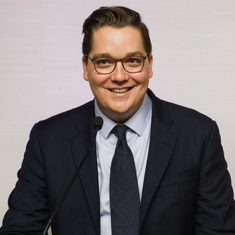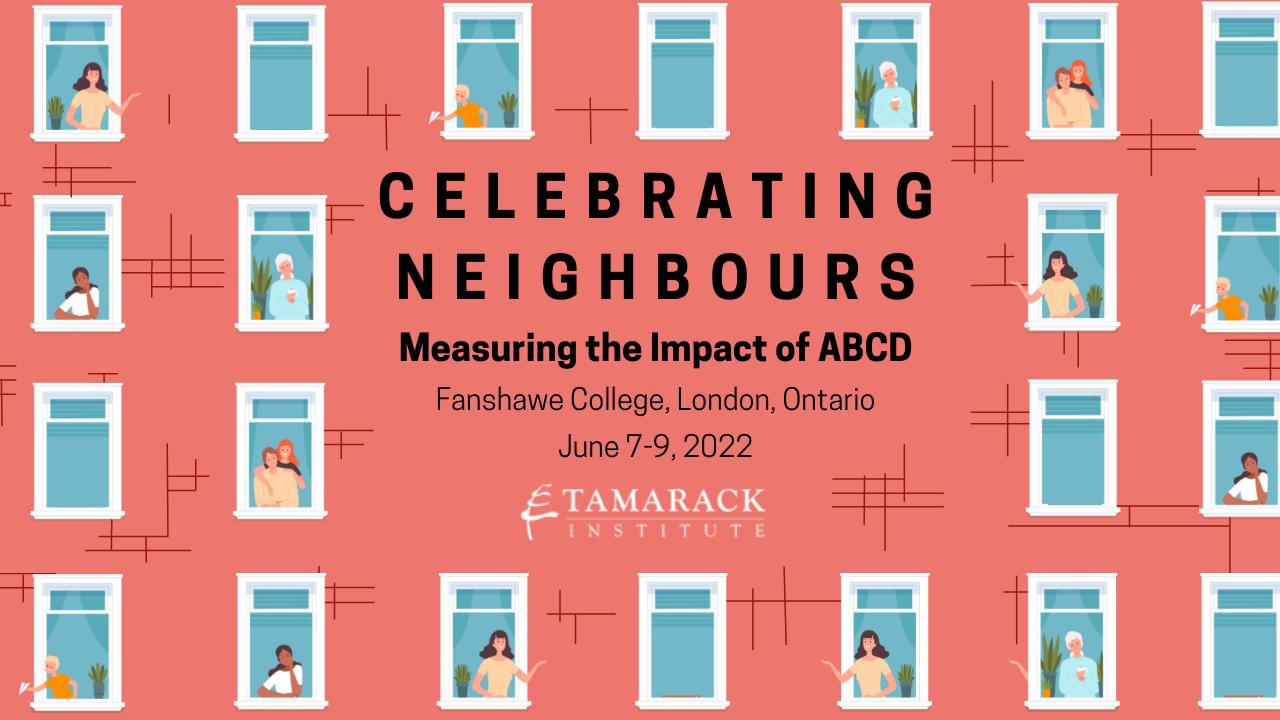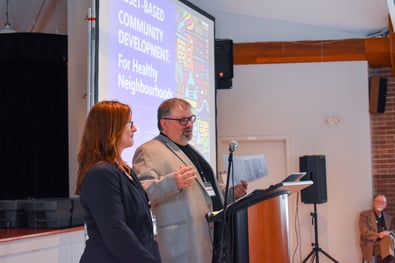 I wish to acknowledge Paul Born and the entire Vibrant Communities team at the Tamarack Institute, with special thanks to Heather Keam for the invitation to reflect on the masterclass workshop at Asset-Based Community Development for Healthy Neighbourhoods.
I wish to acknowledge Paul Born and the entire Vibrant Communities team at the Tamarack Institute, with special thanks to Heather Keam for the invitation to reflect on the masterclass workshop at Asset-Based Community Development for Healthy Neighbourhoods.
In April 2018, I attended Asset-Based Community Development for Healthy Neighbourhoods held in Kitchener, Ontario, as a guest of the Tamarack Institute for Community Engagement. My interest in attending was to reconnect with Paul Born, Co-CEO of the Tamarack Institute, after hosting him for an event at Western University in 2014, and to take the opportunity to learn from John McKnight, one of the founders of Asset-Based Community Development (ABCD). I was also grateful to meet Cormac Russell of Nurture Development (Ireland) after contacting him in November 2016, knowing he was scheduling a visit to see John McKnight. My intent in reaching out to Mr. Russell then was to ask him to give my best to Mr. McKnight, whose address on a panel at the Coady International Institute in 2013 continued to inspire, and, without hesitation, Mr. Russell replied confirming that he would pass on my message. Not only that, he replied to say he shared a similar affection for this wisest of teachers, which is a sentiment I took as fact but also as an act of generosity on the part of Mr. Russell in that he positioned himself as a learner, like me, when he is a world-renowned teacher in ABCD.
Read the note sent to Cormac Russell in November 2016 about John McKnight:
I had the privilege of sharing a few moments with...[John McKnight] at the Coady Institute in Canada back in 2013, when I was asked (and I’m so grateful to have been asked) by then Coady Director John Gaventa to respond to a stirring panel talk Mr. McKnight gave...I can’t tell you how often I go back to his words and presence as a guiding principle. He’s a true teacher, and I would love to spend time with him...I have the feeling you will help carry out his work and build on his legacy, as a teacher, not unlike him...please give him my best.
A cornerstone of the learning agenda for ABCD for Healthy Neighbourhoods presented by Tamarack Institute was the masterclass workshop, delivered in two separate but related parts, the first by John McKnight and the second by Cormac Russell. Taken together, the two parts of the masterclass workshop saw both teachers draw on their vast experience in community life to highlight the main principles and best practices of ABCD, which on the whole recognizes the power that people have in working together to use their gifts and skills (i.e., assets) to realize the change they want to see in their local communities. In learning about the benefits of associational life in the first part of the masterclass workshop and making note of the proven methods of creating community change in the second part, what strikes me as a learner in the presence of these teachers is their deliberate use of story to make such an impression on the listener that the lesson will be absorbed and transmitted. And that lesson is lesson enough: stories told to others with a deep sense of care can have a lasting impact beyond the present, no less than creating relationships between self and other.
After attending the masterclass workshop, and later in a space that encouraged conversation, Mr. Russell approached me to ask what circumstances may have led to this place in my work, and the answer I offered him after brief pause, and which he later told me resonated with him, was I found myself over several years at a place in my life where I was seeking teachers.
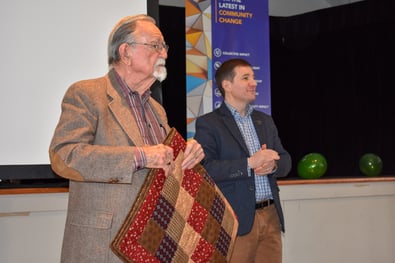
Here, in conversation with an expert teacher, I was encountering someone who could reveal otherwise hidden realizations about oneself in relation to others by asking effective questions, which to my mind is the most singularly powerful gift any teacher of community can possess. It is worth noting that the craft of asking questions is fundamental to Mr. Russell’s work, which only makes sense given that the roots of ABCD are in qualitative and participatory research.
To this end, Mr. McKnight let us know in the masterclass workshop that it was only in asking questions (e.g., Can you tell us what people who live here have done to make things better?) in a study on neighbourhoods in the late 1980s with Jody Kretzmann that allowed them to collect 3000 stories and discover the main principles of asset-based community development.More to the point, Mr. Russell holds in abundance the gift of asking questions, but what I also gather is that he believes it is a gift we all share and can develop with practice. To illustrate, we need to consider the plea he made in the masterclass workshop that
“Crafting questions is really important” alongside another idea he shared, “Modern life is like a grinding machine.”
Juxtaposing these two sentiments demonstrates the notion that questions can be developed as part of a tradition of conversation of which we are all capable, much like practicing a craft, but together these ideas also reveal that in modern times our capacity to ask thoughtful questions born of care for one another has been limited by the mechanization of our lives, more akin to mass-produced products than local wares handcrafted with care. That is to say, our lives, like products, so often removed from the source of their own creation, can leave us without the awareness needed to formulate well-considered questions of others, but this lack of insight need not be the final word, so to speak, because, as discussed in the masterclass, we can learn to craft thoughtful questions through the process of developing relationships. The point here is learning to ask questions takes practice, but, as a gift we all share, we are able to improve on crafting questions by continuing to connect with others through stories; the larger point, then, is questions beget stories, and stories connect us in relationships, the likes of which lead to community, where we can discover our gifts in association with one another.
Revisiting my response to Mr. Russell that I was seeking teachers in my work proved insightful because it helped me understand the need to come to terms with my own learning. Establishing an associational life with thinkers and practitioners in ABCD allowed me to find those teachers who could bring me back to community when it felt all but lost in my work life. What I was also happy to learn, and what I always thought must be the case, is that this pursuit was not simply a vain attempt to be associated with key thinkers in this area of study. Quite the opposite: the pursuit of seeking teachers continues to mean everything to me as a learner, who through the process of pursuing a university education felt the real loss of a lived community, which is one sustained by sharing stories and taking up tradition with others. What is more, I believe the process of seeking teachers with insights into community was my attempt to find ways to bridge the gap between the life-forming education I received as part of a community in a fishing village in Cape Breton, Nova Scotia and the formal education I have been pursuing while studying literature in university for what amounts to many years by now.
While stories have made up a large part of my education in the traditional and formal sense, and I know deep down I studied literature as a way to ask questions of storytellers, I think there is a curious lack of concern for others in literary studies that can remove stories from community, both the lived community that produce such stories and any learning community. The result was devastating in my life: the advanced study of literature left me feeling alienated and in need of connection with a lived and learning community that were both at a distance. As it turns out, the way back to community for me was found in seeking teachers, and those that resonated with me were, of course, also the most gifted storytellers, each demonstrating a commitment to others by sharing stories of real people in real places, to use a manner of speaking, with attention given to the specific ideas and activities that gave rise to community.
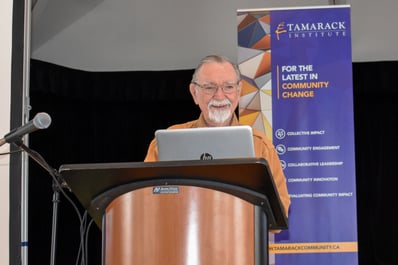
It is no surprise that in the process of discovering ABCD, which is still unfolding but began while studying social change at the Coady International Institute in 2012, I found teachers, that is, teachers whose wisdom was both lived and learned, the stuff of stories and questions.
One such teacher is John McKnight, who has inspired countless others with his teachings, which range from stories of hope and resilience to sweeping commentary on modern life, delivered with a warmth of spirit and command of language that holds you in rapt attention to the point you feel changed having listened to him, more yourself yet more deeply connected. That deep connection speaks to community as the passage of story between self and other, and for that particular insight, and for the singular wisdom of John McKnight, whose teachings in ABCD continue to help me locate myself and realize my connections, I am forever grateful. More than a method of research or approach to development, while it is born of those things, the theory and practice of asset-based community development is a way to retell our stories, which we must do time and again as a way to renew and reimagine the world here and now.
Learn More:
Stories to Tell Us: Address by John McKnight with Response from Joel R. Burton
Cormac Russell Tells the Story of John McKnight and ABCD by Paul Born
The ABCD Workshop – What We Learned and What's to Come By Heather Keam
